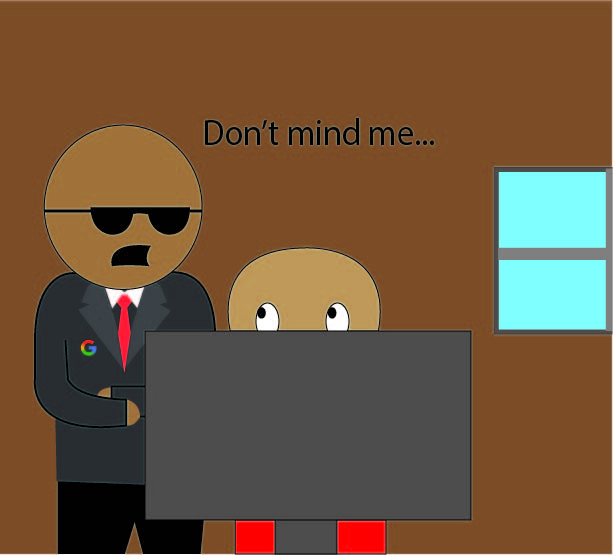Google Tracking Users without Permission
February 17, 2022
Tech giant, Google, is facing a lawsuit for allegedly tracking its users without permission. The court date is set to Sept. 12, 2023. Google faced a similar lawsuit prior to this, but the judge of that case did not think there was sufficient evidence to win the lawsuit. However, this new lawsuit seems to have plentiful evidence, with four attorney generals involved. Google’s motive: profiting big time from selling data that they obtain from location tracking, as it can collect information that leads to more targeted ads for the ad partnership side of their business. Thus, when people turn off location history, as many do, Google is losing out on ways to increase business and ad effectiveness. In fact, according to CNBC, “Google profited from the deception by fueling its advertising business with such data.” Senior Jenna Dedhar is not surprised because this is what she expects from big tech companies, saying, “They do what they need to do to get that money.”
However, Google claims that these allegations are false and their spokesperson, José Castañeda, rebuts saying, “The attorneys general are bringing a case based on inaccurate claims and outdated assertions about our settings.” So, there are definitely two sides to this case, but the difference between this and the previous lawsuit is that there is sufficient evidence of dark patterns used by Google, which are a significant piece of proof that they meant to purposely mislead users. Dark patterns are a technique used by companies to lead users in a certain direction or to a certain choice. CNBC says, “They include behaviors such as complicated navigation menus, visual misdirection, confusing wording (such as double negatives), and repeated nudging.” So, despite Castañeda’s claim that Google will “vigorously defend ourselves and set the record straight,” it is up to a judge to decide what the record really says, and if this misleading was purposeful.
Freshman Audrey Beaver thinks Google is in the wrong, and the fact that they could get away with it concerns her. Beaver says, “I think that consumer privacy is a very serious issue, and many companies like Google are taking advantage of their users.” Beaver is not alone with the many students whom this issue concerns. Associated Press News (AP News) understands the scope of this problem as well, saying, “The privacy issue affects some two billion users of devices that run Google’s Android operating software and hundreds of millions of worldwide iPhone users who rely on Google for maps or search.” Teens are a demographic that tend to be most at risk because they are online so much and use Google on a daily basis. For example, sophomore Dia Aggarwal states, “Google is my primary search engine.”
As far as AP News is concerned, the allegations were confirmed when they had suspicions that turning off Google’s “Location History” setting did not stop the search engine from keeping tabs on users’ whereabouts. Google said this setting would prevent the company from saving locations that were previously traveled to, but AP challenged the validity of this statement by conducting an investigation: “This map shows where Princeton privacy researcher, Gunes Acar, traveled over several days, from data saved to his Google account despite ‘Location History’ being off.” Their research seemed to be conclusive, yet not in favor of Google, sporting solid proof that even with the setting turned off, location was tracked and data was saved, all while users were under the impression that it would not be. This false impression sources from Google Support, which states that “you can turn off Location History at any time. With Location History off, the places you go are no longer stored,” but this investigation allows us to clearly see that history was in fact stored.
In addition, Google collects location data from searches unrelated to location, according to U.S. News, which states, “Searching within Google for things such as recipes or online shopping, pinpoints a person’s longitude and latitude. All of this information is then saved to that user’s Google account.” With so much conclusive research, some people believe it is the right of the public to be informed of this breach of Google’s own agreement to users. For example, junior Becka Perez expresses, “The public does have a right to know because it is invading their privacy. And if Google tries to hide it, that could ruin their reputation.”
This lawsuit is regarding the time frame 2014-2019, but a consensus is yet to be reached. Although right now, things do seem to be in Google’s favor court-wise. According to the judge of the most recent filing, “A reasonable fact-finder could find that a reasonable, or even an unsophisticated, consumer, would understand that at least some location information is collected through means other than [‘location history’].” The judge is saying users should understand that Location History is not the only setting collecting data on their whereabouts. He is disregarding both Google’s intentions, as well as the history data they actually did collect under the idea that users should have the critical thinking skills to know that more than “Location History” is involved in tracking location. In conclusion, there are certainly two very different viewpoints on this one issue, and as Google users themselves, IHS students provided thought-provoking perspectives.



